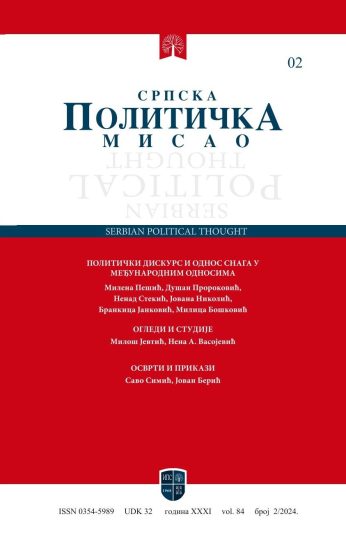Тема броја
ГЕОПОЛИТИЧКА И ИДЕНТИТЕТСКА СТВАРНОСТ СРБИЈЕ И БАЛКАНА
CULTURAL STUDIES – FROM DISCOURSE TO REALITY: CASE OF SERBIA
Сажетак
The paper analyses some particularly important ideas and concepts that have made the Studies of Culture or Cultural Studies part of a specific area of exploring culture. The emphasis is put on the relation which is established between the theory–ideology and reality, and in this respect it is proven that the decades-long linking of this area with the postmodern theoretical paradigms becomes redundant and inadequate for the interpretation of culture today. The motive for such analysis is related to the development of these studies in the post-Yugoslav region with emphasis on the changes brought about by the development of populism and authoritarianism in Serbia, for which the Cultural Studies are not theoretically equipped.
Референце
- Đorđević Jelena, „Kultura/politika i otpor”, u zborniku: Kultura, rod, građanski status (priredile: Daša Duhaček, Katarina Lončarević), Fakultet političkih nauka, Centar za studije roda i politike, Beograd, 2012, pp. 3-26.
- Đorđević Jelena, Postkultura, Clio, Beograd, 2009.
- Fiske John, Understanding Popular Culture, Unwin Hyman, Boston, 1989.
- Fisher Mark, Capitalist Realism: Is there no Alternative, Zero Books, John Hunt Publishing, London, 2009.
- Hall Stuart, “Cultural Studies and its Theoretical Legacies”, in: Stuart Hall: Critical Dialogues in Cultural Studies (eds. David Morley, Kuan-Hsing Chen), Routledge, London – New York, 1996, pp. 261-274.
- Hall Stuart, “Notes on Deconstructiong ‘The Popular’”, in: Popular Culture: A Reader (eds. Raiford Guins, Omayra Zaragoza Cruz), Sage, London, 2005, pp. 64-71.
- Hall Stuart, “Introduction, Who Needs ‘Identity’?”, in: Questions of Cultural Identity (eds. Stuart Hall, Paul Du Gay), Sage, London, 1988.
- Hardt Michael, Negri Antonio, Empire, Harvard University Press, 2000.
- Jameson Frederic, The Cultural Turn: Selected Writings on the Postmodern, 1983-1998, Verso, Brooklyn, 1998.
- Lal Vinay, Nandy Ashis (eds.), The Future of Knowledge and Culture, A Dictionary for the 21st Century, Penguin, London, 2005.
- Lazarević Rаdak Sanja, „Dekonstruisanje Srbije: od postkolonijalizma do poluperiferije”, Srpska politička misao – posebno izdanje, br. 3/2016,
Institut za političke studije, Beograd, pp. 105-119.
- Maze Kaspar, Bezgranična zabava, uspon masovne kulture 1850-1970, Službeni glasnik, Beograd, 2008.
- McGuigan Jim, Cultural populism, first published in 1992 by Routledge, this edition published in the Taylor & Francis e-Library, 2003.
- Mouffe Chantal, Democratic Politics and Conflict: An Agonistic Approach, University of Westminster, Vol. 9, 2016.
- New Cultural Studies (eds. Gary Hall, Clare Birchel), Edinbourg University Press, 2016.
- Simić Marina, „Studije kulture i antropologija: Sudar titana ili narcizam malih razlika”, Genero 18, Beograd, 2014, pp. 89-108.
- Sokal Alan, “A Physicist Experiments With Cultural Studies”, Lingua Franca, May – June, 1996.
- Šuvaković Miško, „Epistemološka pitanja o filozofiji, teoriji i politici u graničnim zonama modernosti, postmoderne i savremenosti”, Srpska
politička misao – posebno izdanje, br. 3/2016, Institut za političke studije, Beograd, pp. 37-52.
- Wolf Carry, “Theory as research program – the very idea”, in: Theory after Theory (eds. Jane Elliott, Derek Attridge), Routledge, London – New
York, 2011.
- Wood Brennon A., “Stuart Hall’s Cultural Studies and the Problem of Hegemony”, British Journal of Sociology, vol. 49 (3), 1998, pp. 399-414.

